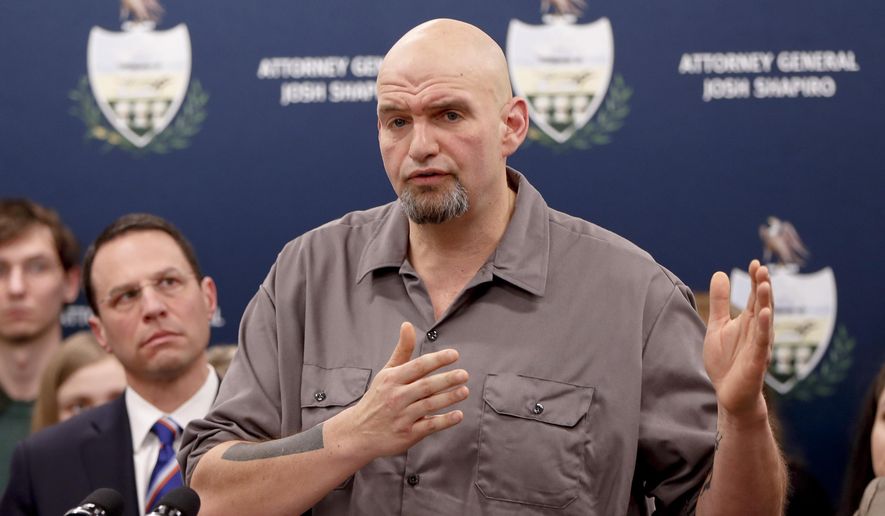Wisconsin State Treasurer Sarah Godlewski made it crystal clear when she launched her U.S. Senate bid last month that she wants to ax the legislative filibuster.
Ms. Godlewski is among the Democrats in the developing field of Senate candidates who are betting primary voters will reward them for vowing to remove the 60-vote threshold required to pass bills through the upper chamber.
“Yes, we can get rid of the filibuster because that’s what it takes to get the job done,” Ms. Godlewski said toward the end of her launch announcement. “People say we can’t fix the Senate, but I don’t buy that.”
The issue is becoming a litmus test in the early stages of the 2022 election cycle and could prove to be a dividing line in the battle for control of the Senate.
The “abolish the filibuster” movement has gained momentum in recent years as members of both parties struggle to carve out a consensus on their priorities.
President Trump pushed unsuccessfully to persuade Republican senators to abolish the filibuster. He warned that Democrats would do so if given the chance.
Despite the filibuster’s unpopularity among liberals, Democrats have not changed the decades-old rule in part because of opposition from the likes of Sens. Joe Manchin III of West Virginia and Kyrsten Sinema of Arizona.
President Biden also has yet to endorse the idea.
Instead, he has sidestepped Republican opposition through executive orders and a fast-track process known as budget reconciliation, which cleared the way for the $1.9 trillion American Rescue Act.
But reconciliation is limited to budget and spending bills, which means Democrats need the support of at least 10 Senate Republicans to tick off many of the items on their wish list.
Democrats and liberal activists fear Mr. Biden’s agenda will have no chance of becoming law unless they end the 60-vote requirement and allow bills to pass through the upper chamber with a simple majority vote.
In the race for the open U.S. Senate seat in Pennsylvania, Lt. Gov. John Fetterman said that if Democrats want to make inroads on their push to raise the minimum wage to $15 per hour and tackle climate change, “you need to get rid of the filibuster.”
“This idea that some random senator from a state with 600,000 people can hold up the democratic will and sense of urgency that these policies are coming from, I don’t think that is very democratic at its core,” Mr. Fetterman said on MSNBC this year.
In North Carolina, state Sen. Jeff Jackson has signaled that he is open to the idea. He said he isn’t convinced that Senate Minority Leader Mitch McConnell, Kentucky Republican, has an “incentive to actually deal with Democrats in a bipartisan way.”
“I think what he is going to do is run the same play he ran the last time as minority leader, which is to use the filibuster to block everything,” Mr. Jackson said in a recent interview with Spectrum News. “We can’t allow that to happen.”
Mr. Jackson, who is seeking his state’s U.S. Senate seat in 2002, said voters tell him they want their elected leaders to take action on climate change, the minimum wage and expanding broadband access.
He said those priorities have no chance “if we let Mitch McConnell use the filibuster as a weapon to grind everything to a halt.”
“No one has told me, ‘Hey, Jeff, here is what I want from my next senator: Go up there and make sure the filibuster remains intact even if it means we can accomplish nothing of what we truly need,’” he said. “Zero people have said that to me.”
A Monmouth University national survey released last week said 38% of adults want to keep the filibuster in its current form, 38% support changing the way it is used and 19% support scrapping it entirely.
Opinions split largely along partisan lines.
Among Democrats, 49% support changes to the rule, 30% support getting rid of the filibuster and 14% want to keep the rule in place. Among Republicans, 64% support keeping the current rule in place, 22% support some changes and just 10% support abolishing the filibuster.
Patrick Murray, director of the Monmouth University Polling Institute, said the filibuster is a “defining issue for most Democrats.”
“You are not going to win over the party base in a competitive primary by supporting the status quo here,” Mr. Murray said. “It’s also an easy call for Dem candidates to make.”
“It may be an important litmus test in a primary, but based on where public opinion stands right now, it’s not likely to come back to bite you in a general election,” he said. “Most independents either support changes to it or, even more likely, simply don’t care enough to make it a decisive factor in their vote.”
The filibuster was adopted to give the minority party a voice in the Senate, but both parties have been chipping away at the rule in recent years.
It started in 2013 when Senate Majority Leader Harry Reid of Nevada resorted to the “nuclear option” to circumvent Republican opposition to President Obama’s executive branch and judicial nominations. Mr. Reid’s changes did not apply to the Supreme Court, though that exception didn’t last long.
Senate Republicans lifted the threshold in 2017 to overcome Democratic opposition to Supreme Court Justice Neil M. Gorsuch.
The issue divided the field of 2020 Democratic presidential contenders. Mr. Biden opposed eliminating the filibuster. Vice President Kamala Harris, a senator at the time, was open to it, and Pete Buttigieg, now transportation secretary, joined liberals such as Sen. Elizabeth Warren of Massachusetts and said the filibuster must go.
• Seth McLaughlin can be reached at smclaughlin@washingtontimes.com.




Please read our comment policy before commenting.